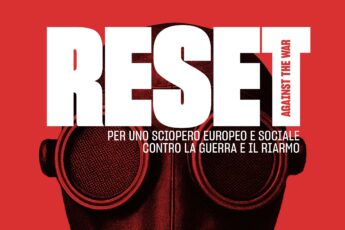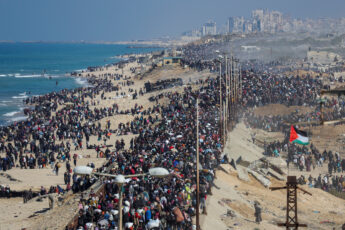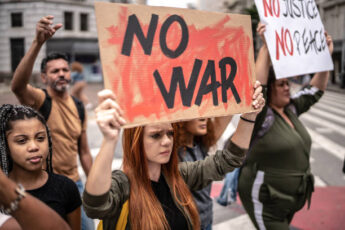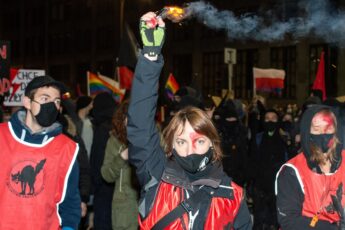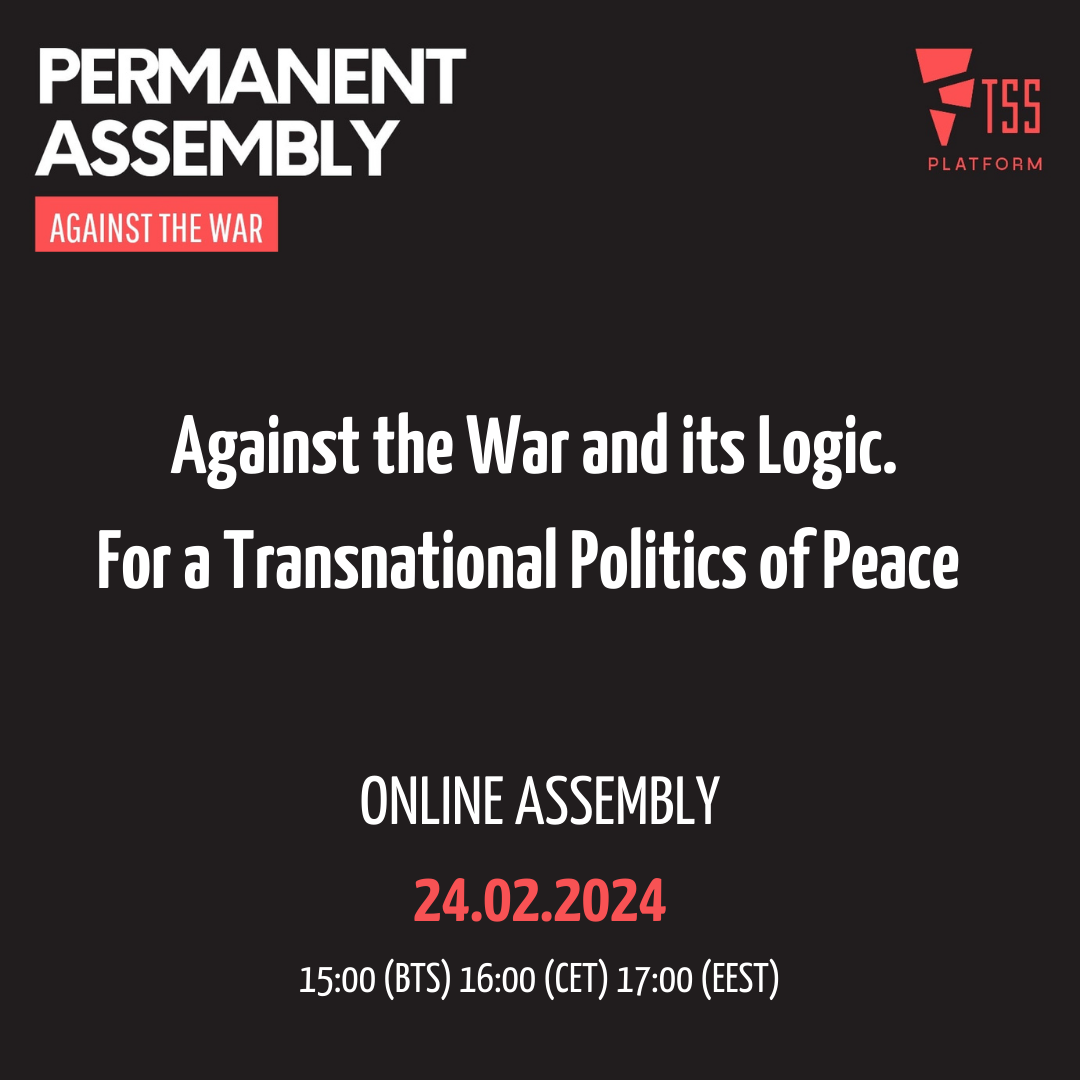
by PERMANENT ASSEMBLY AGAINST THE WAR
Translations: German – Greek – French – Italian – Turkish
Facebook event here
To receive the link to join the online meeting:
On the second anniversary of the Russian invasion of Ukraine, we invite everyone to an online assembly to collectively face the new daring situation. While a daily massacre is ongoing in the Gaza strip, one thing is becoming clear: the war is expanding, the war will last, we need collective strategies to reject the inevitability of the war.
We see a new front of war opening in the Red Sea, where a strategy is in place to balance the region by removing Iran’s constant threat to close the Strait of Hormuz and by turning it into a stable and cheap corridor, that sustains the new trade routes to Europe via India-Iran-Russia and China’s Silk Road revival through Central Asia-Iran-Turkey. With these shifts, considering Iran might join the atomic powers is not far from the reality. A reality which potentially can guarantee for more arms race in the region. We see the preparation for war in the Baltic countries; the increasing attacks against the Kurdish population and political project by the Turkish state (which has strong economic ties with Israel, even if Erdogan says he supports Palestine); the announced establishment of a Russian base for up to 10,000 servicemen in the Central African Republic; the recruitment of migrants from Central Asia in the Russian Army, in exchange of Russian citizenship; the drumroll in East Asia, from North Korea to the Taiwan Strait; the complete absence of even the most insufficient institutional plan of pacification and the radical crisis of the international institutions which should grant it; the growth of industrial and ideological militarism. These are just some of the most visible expressions of the new global reality where war is a normal way of managing the crisis of capitalist accumulation and of silencing the ongoing struggles against exploitation and oppression.
To describe this situation we, the Permanent Assembly Against the War, have spoken of a Third World War. We repeat it. This means not only that the war is spreading, but also that its effects and logics go beyond the spaces where it is fought, affecting also social struggles. Even admitting that a new multipolar world is emerging from this scenario, we do not believe that more and new political managers of the capitalist social order will be favourable for social justice, or that they will renounce the logic of war. On the contrary, an even greater expansion of the logic of war could result. Even in a multipolar world, we don’t believe that an autonomous antiwar position could emerge when workers struggles and social movements are buried under the weight of geopolitics, or reduced to supporters of authoritarian regimes, confessional political projects, or national politics. As long as we remain passive or take positions in favour of one or the other belligerent side, we are digging our graves with our own hands. It is more urgent than ever to form some clear positions and work collectively for the practice of a transnational politics of peace, finding our resources in the ongoing struggles and manifold acts of refusal which today fuel an expanding and long-lasting opposition to the war.
From the very beginning of the war in Ukraine, we have witnessed the lack of a strong, transnational movement against the war. We have been galvanized, in the first weeks of the Israeli blind revenge and politics of death and ethnic cleansing in Gaza, by the people who protested massively on the streets of the world demanding a ceasefire. This massive and spontaneous opposition to militarist horror is crucial, and, beyond humanitarian sentiments, it expresses a claim for justice voiced by a multitude of subjects, workers, migrants, women and lgbtqi+ people, who do not want to be oppressed and exploited any longer. Yet, denouncing massacres is not enough if we want to fight against the war and its reproduction. This is why we need to support the claim for freedom for Palestine and the call for an immediate ceasefire by strengthening our transnational connections. We shouldn’t perceive the atrocities committed by the IDF in Gaza as a mere continuation of the 75 years of occupation, nor the ones committed during the Hamas’ attacks as an inevitable continuation of the Palestinian Resistance. The Third world war scenario connects Palestine, Ukraine, Yemen, and is more than the mere sum of many local wars: it is reshaping what is happening in Palestine beyond the history of a long-lasting experience of colonial oppression. It is up to us to reshape also our solidarity with Israeli war resisters and the Palestinians who are killed, exploited and oppressed, as part of a stronger, transnational opposition to the war, fuelled by the force of collective struggles against racism, exploitation, and patriarchy which could not be reduced to nationalist claims, State politics or authoritarian religious projects.
While we don’t see yet a wide movement against the war, acts of refusal of the war are widespread. The demand of an immediate ceasefire in Palestine resonated during the massive feminist demonstration against patriarchal violence on the 25th of November in Italy. The mothers and wives of soldiers in Russia are challenging the governmental repression by denouncing the poverty which have forced their male relatives to accept to die in an endless war, while the rich have successfully escaped. Latin American migrants marching at the US/Mexican border are practically refusing the merchandising of their lives made by the US government and the republican opposition, which is claiming for a stronger militarization of that border in exchange of the funding of weapons for the Ukrainian army. The protests in France against the racist immigration law that was just voted, also feeding on anti-Islamic mood everywhere because of the support granted by the French government to the Israeli attacks on Gaza, were coupled with the opposition to the war. The strikes for better wages, against the inflation effects of the growing price of fuels and primary resources caused by the war, contain the seeds of a transnational politics of peace.
However, this project requires spaces of discussion where we can collectively face the deep contradictions in front of us. After the new law for mobilization in Ukraine, an increasing number of men are running away or hiding. Also in Russia, desertion is a mass refusal of the war, but it must remain a clandestine movement to avoid repression and the forced enlistment into the army, while Western countries, like Estonia, declared to be ready to extradite to Ukraine those refugees who are subject to mobilisation. In all the countries neighbouring Ukraine, the fear of the war is feeding a wide support to the politics of NATO or of militarisation among the working class. While this support is granted also by more or less openly fascist governments, in order to obtain an international legitimation as part of the Western front, the opposition against the race to armament is often voiced by far-right parties, while the contestation of those parties – like the massive demonstrations in Germany – does not always articulate a clear opposition to the war. A shift towards the right is also happening at the other end of the political spectrum: ”democratic”’ forces embrace militarism as an unavoidable choice while pushing for racist policies in the name of national security; as authoritarian and oppressive regimes present themselves as leaders of an emerging “multipolar” world, sections of the left advocate that tyrannical, authoritarian, and reactionary forces and regimes represent a progressive resistance to “Western imperialism”. Many of those who one year ago supported Iranian women shouting “Woman, Life, Freedom” are now supporting the so-called Axis of Resistance, thus legitimising a political Islam which is not a rival of capitalism and makes patriarchy a foundation of its projects. Nationalism ends up being the language of those who fight for the end of oppression, whether this oppression is represented by the Russian invasion of Ukraine, by the West, or by the unbearable ethnic cleansing of the Israeli State against Palestinians. We take a firm stand against people being exploited and oppressed because of their nationality, since we know that all nationalisms are exclusionary and oppressive. For building a transnational politics of peace, we must confront all these contradictions: as Iranian feminists clearly stated, we will not pursue a collective liberation by choosing between national fronts, we refuse that our only chance is that to choose between the “bad and the worse”. A transnational politics of peace begins by refusing the imposition of belligerent fronts as part of the war logic, and to organize our side: together with workers, women and queer people, migrants who are challenging that logic beyond the war fronts.
As we clearly stated right after the Russian invasion of Ukraine, the war is limiting our possibilities of struggle, deploying its consequences beyond the horror of the battlefields. Movements for climate justice are increasingly repressed; war and militarism reinforce patriarchy and patriarchal societies reinforce a culture where violence against women and Lgbtq* persons are normalised. The ordinary disagreements of the European Union disappear when the war on migrants is to be fought. To practice a transnational politics of peace, we need to recognize that the war on workers, the war on women, the war on migrants are not side-effects but rather the everyday reality of the ongoing world war, which we must fight back.
This is why on February 24th, we will organise an on-line public meeting where voices from the different fronts of war can speak against the war, but also voices of those who, aware of its consequences, have taken a stance against the war.Together with class struggle organisations and social movements, together with war resisters and deserters from the various war fronts, together with feminists, migrants, precarious workers and environmental activists we aim to create an autonomous anti-war movement against the capitalist machine of death and despair. This event will hopefully also serve as a bridge towards the mobilization of March 8th, when we need to support the speaking out against the war in all the initiatives that are going to take place. We express our solidarity with our comrades in Kazakhstan, where the protests for March 8 have been prohibited.


